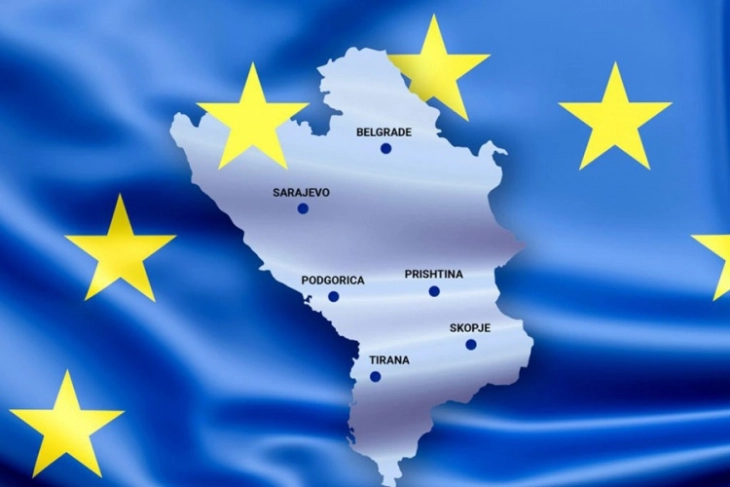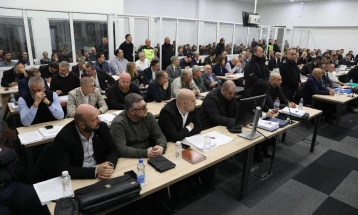Debate: Western Balkan countries to decide whether they are with EU or with Russia

Skopje, 25 March 2022 (MIA) - The integration of the Western Balkan countries in the EU is a strategic goal not only for the region itself but for the entire EU, which is seen now in the context of the conflict between Russia and Ukraine. The Western Balkans should be given a clear perspective in order to avoid a change in public opinion about the EU and to open room for third actors to fill the gap. However, both the candidate countries and potential candidates must decide which side they are standing on, are they with EU or with Russia, it was said on Friday at the roundtable on the topic “Western Balkans and the EU in the context of new challenges in security policy.”
The event is organised by the German Embassy in Skopje on the occasion of the visit of Susanne Schütz, Director for the Western Balkans, and Sabine Stöhr, Director for EU Policies, both in the German Federal Foreign Office.
Schütz noted that as early as 2003, when the EU decided on the European future of the Western Balkans, it realized that its integration was a strategic goal not only for the region itself but also for the EU. She said Russia's attack on Ukraine is an unprecedented event, and something not seen in Europe for decades.
“In the face of this tragedy we are realising that while we knew for a while that there is an influence of third actors in this region, we understand that Russia is ready to use all means to push through its goals. Ukraine is one thing, but Western Balkans with their aim is to become EU members, and some countries are NATO members, is still perceived as threat and entry point for further destabilization by Russia,” Schütz said.
According to her, Russia uses unresolved conflicts, weak media structures, affinity to corruption and these are entry points against the fact of all security architecture built after WWII and human rights regulations, which we decided upon, is being destroyed.
“And we need to defend it and this is a wake up call for the EU to continue more determinedly even with EU integration and enlargement. Now is the time for the Western Balkans countries to continue with their performance of the results and reforms, and to decide which side they are standing on, are they with the EU or with the Russia or against the EU. This is a question that each country and individual has to answer for themselves. We consider that all countries who want to become EU members have to be firm with the EU in the light of the ongoing war there can be neutrality,” she added.
Sabine Stöhr, Director for EU Policies, in the context of the issue with the Russia-Ukraine conflict said that the weak points are the defence and the question of how far the EU is ready to go in support of Ukraine.
The weak spots are the military response, energy dependency, many countries, including Germany, are too dependent on Russian fossil fuels and intensive work is being done to gradually withdrawing from that dependency, then of course the effect on our economy, but also on world food security, Stöhr said.
According to her, there is no short-term solution and short-term end of atrocities of the war in Ukraine.
Therefore we will keep our unity, which will become more difficult over time because problems will arise, we need to strengthen resilience and strengthen measures and reactions from the Western Balkan countries, which are our allies, friends and like-minded, said Stöhr and added that countries in the region should also be included in EU support measures to deal with the consequences of this crisis.
Nenad Markovikj, a member of the President's Security Council, also spoke at the debate, saying that the possibility of third-country influence in the Western Balkans could be the result of a long process and a stalemate in integration.
“In the country, after each veto - the Greek, French and Bulgarian, there were changes in public opinion and it is more or less normal in the short term. I do not want this to become a trend and a fixed mood among the general population, because public opinion is already strengthening and then the battle for the hearts and minds of the people begins to be lost. An additional problem is that this polarization opens room for maneuver by third parties in the country, as shown by long-term public opinion data,” Markovikj said.
Regarding what can be done in terms of public discourse in order to calm the situation, he stressed that the country has gone through difficult and depressive phases when it comes to relations with the EU and as he said, it is very bad when these depressive phases occur and last a long time.
We need to rationalize the EU discourse a bit. It takes us 20 years to understand that these mood swings are not good for the stability of the region and we need to realize that opening negotiations is only the first step, he added.
Metodi Hadzi Janev, a professor at the Military Academy in Skopje, noted that the developments with Russia and Ukraine are in the context of a new geostrategic competition, which, he thinks, is something that is still not recognized.
That, he said, should be understood and that is how things should be set by both the EU and other countries in the world. He said that what is happening now is a consequence of, as he stressed, the liberal domination of the last twenty-five years.
According to him, in order to deal with the situation, it is necessary to define what kind of defence we want, whether sustainable resilience can be achieved and how resilience can be defined.
In mobilizing and achieving that resilience, the process of Western Balkan integration into the EU should be seen as a two-way street, not a one-way street, he said.
According to him, the bilateral issues that obstruct that process only result in skepticism in public opinion towards the EU and feed authoritarian regimes to act.







